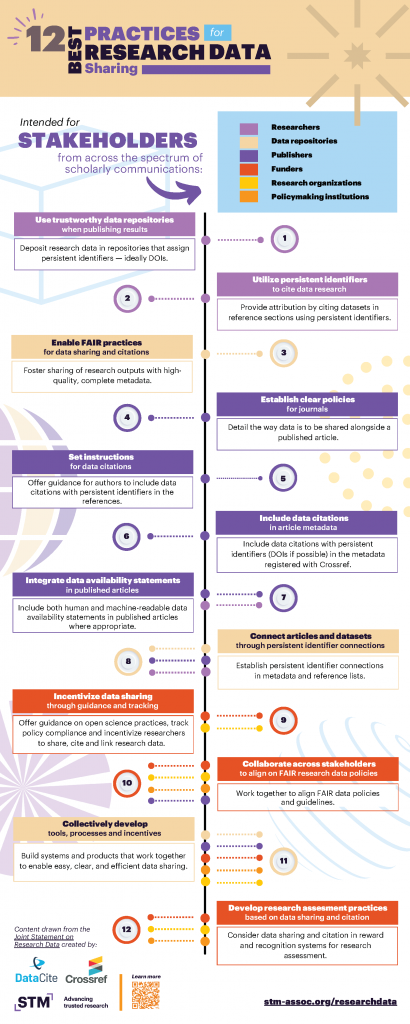In a collaborative effort to promote the linkability and citability of research data, STM, DataCite, and Crossref have released a joint statement on research data.
The statement acknowledges the significant progress achieved since the initial joint statement in 2012 and provides updated recommendations for the various stakeholders involved in research data sharing:
- When publishing their results, researchers deposit related research data and outputs in a trustworthy data repository that assigns persistent identifiers (DOIs where available). Researchers link to research data using persistent identifiers.
- When using research data created by others, researchers provide attribution by citing the datasets in the reference section using persistent identifiers.
- Data repositories enable sharing of research outputs in a FAIR way, including support for metadata quality and completeness.
- Publishers set appropriate journal data policies, describing the way in which data is to be shared alongside the published article.
- Publishers set instructions for authors to include Data Citations with persistent identifiers in the references section of articles.
- Publishers include Data Citations and links to data in Data Availability Statements with persistent identifiers (DOIs where available) in the article metadata registered with Crossref.
- In addition to Data Citations, Data Availability Statements (human- and machine-readable) are included in published articles where appropriate.
- Repositories and publishers connect articles and datasets through persistent identifier connections in the metadata and reference lists.
- Funders and research organizations provide researchers with guidance on open science practices, track compliance with open science policies where possible, and promote and incentivize researchers to openly share, cite and link research data.
- Funders, policymaking institutions, publishers and research organizations collaborate towards aligning FAIR research data policies and guidelines.
- All stakeholders collaborate in the development of tools, processes, and incentives throughout the research cycle to enable sharing of high-quality research data, making all steps in the process clear, easy and efficient for researchers by providing support and guidance.
- Stakeholders responsible for research assessment take into account data sharing and data citation in their reward and recognition system structures.
Below the infographic provides best practices guidance on research data sharing with a wide group of stakeholders. The statement encourages researchers to deposit data in trustworthy repositories with persistent identifiers, and cite datasets using persistent identifiers.

Through collective action and collaboration, researchers, funders, research organizations, data repositories and publishers can contribute to the advancement of open science and enhance the utility and rigor of the scholarly record.
– By Jennifer Gu, Library
Views: 150
Go Back to page Top
- Category:
- Research Data Management Tips
Tags: data repositories, data sharing, research data
published December 13, 2023


